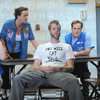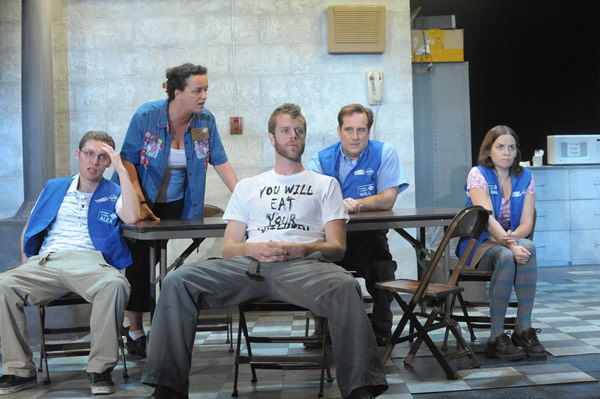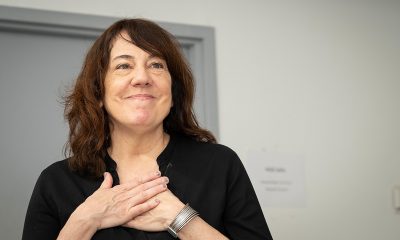Arts & Entertainment
Heartland inspiration
Idaho-born playwright finds middle America ripe for exploration

‘A Bright New Boise’
Through Nov. 6
Woolly Mammoth Theatre Company
641 D Street, NW
$20-$67.50
202-393-3939

From left, Joshua Morgan, Emily Townley, Felipe Cabezas, Michael Russotto and Kimberly Gilbert in ‘A Bright New Boise’ by Samuel D. Hunter. (Photo by Stan Barouh; courtesy Woolly Mammoth Theatre)
For up-and-coming gay playwright Samuel D. Hunter, Idaho is an outsized source of inspiration.
“I’m originally from Idaho, and most of my plays are set there,” he says. “It’s a sort of canvas for me. Typically I like to use places and things I know as a jumping off point to explore things I’m not quite so sure about.”
Hunter’s best known play, “A Bright New Boise” for which he won a 2011 Obie Award (the off-Broadway Tony) for playwriting, is running at Woolly Mammoth and is the first of his plays to be produced in D.C. Set in the break room at a big box craft store called Hobby Lobby, “Boise” is a dark comedy whose central character is obsessed with the rapture.
“I’m very interested in people who want the world to end,” says Hunter, 30. “They’re so hard to figure out. But the play is about a lot more than the rapture. The spine of the story is the reunion of a father and his long lost son. It’s a human story that’s pretty universal.”
In recent weeks, Manhattan-based Hunter has been in D.C. completing rewrites and spending extra time with his partner John Baker, Woolly’s literary manager. Thus far, Hunter reports positively about the quality of the production (staged by gay director John Vreeke and featuring, among others, gay actors Michael Russotto and Joshua Morgan as the father and son, respectively).
Hunter’s characters aren’t particularly glamorous: They hold menial jobs, profess fundamentalist beliefs and are in many ways similar to a lot of Americans. “I like to write about folks who aren’t typically written about. Do we really need another play about rich white people getting divorced? Granted there are some good plays on the subject, but there’s so much more to put on our stages.”
Growing up in smallish Moscow, Idaho, Hunter (who goes by Sam) attended a Christian day school and worked part time at Wal-Mart. After high school, he attended New York University where he majored in dramatic writing and minored in Middle Eastern Studies. Later, he received an master’s degree from the Iowa Playwrights Workshop. Since then, he’s taught at Fordham University, as well as in the Occupied Palestinian Territories at Ashtar Theater (Ramallah) and Ayyam al-Masrah (Hebron). But mostly he writes plays.
Winning the Obie Award was definitely a turning point in Hunter’s increasingly busy career. “It’s not like I won an Oscar, but yes, it lifted my career. It used to be there were all the fancy people and then there’s me. After winning I began to feel like a member of the club. I finally believed it was possible for me to sustain a career in theater.”
And now as a hot emerging playwright with a progressively more demanding schedule, Hunter has had to give up the regular teaching gig. In addition to “Boise’s” D.C. run, Hunter soon has other plays opening at the Denver Center, and, yes, the Boise Contemporary Theater. Sounding almost entirely convinced, he says, “I have my life figured out for the next year and a half, and I’m pretty certain I can survive on what I earn as a playwright. Considering the economy, I think that’s pretty good.”
And what’s Hunter writing about now?
“A lot of my past plays involve dull jobs and parking lots. Currently I’m working on a play about the Home Shopping Network and the culture of all that. I enjoy exploring boring things. If I still lived in Idaho, I’d probably be writing about New York City.”

Team DC, the umbrella organization for LGBTQ-friendly sports teams and leagues in the D.C. area, held its annual Night of Champions Awards Gala on Saturday, April 20 at the Hilton National Mall. The organization gave out scholarships to area LGBTQ student athletes as well as awards to the Different Drummers, Kelly Laczko of Duplex Diner, Stacy Smith of the Edmund Burke School, Bryan Frank of Triout, JC Adams of DCG Basketball and the DC Gay Flag Football League.
(Washington Blade photos by Michael Key)




















The 2024 National Cannabis Festival was held at the Fields at RFK Stadium on April 19-20.
(Washington Blade photos by Michael Key)
















Covering the @NatlCannaFest at RFK Stadium for @WashBlade . Stop by the LGBTQ+ booth and pick up a paper if you are here. pic.twitter.com/is7hnsaPns
— Michael Patrick Key (@MichaelKeyWB) April 20, 2024
Theater
‘Amm(i)gone’ explores family, queerness, and faith
A ‘fully autobiographical’ work from out artist Adil Mansoor

‘Amm(i)gone’
Thorough May 12
Woolly Mammoth Theatre
641 D St., N.W.
$60-$70
Woollymammoth.net
“Fully and utterly autobiographical.” That’s how Adil Mansoor describes “Amm(i)gone,” his one-man work currently playing at Woolly Mammoth Theatre.
Both created and performed by out artist Mansoor, it’s his story about inviting his Pakistani mother to translate Sophocles’s Greek tragedy “Antigone” into Urdu. Throughout the journey, there’s an exploration of family, queerness, and faith,as well as references to teachings from the Quran, and audio conversations with his Muslim mother.
Mansoor, 38, grew up in the suburbs of Chicago and is now based in Pittsburgh where he’s a busy theater maker. He’s also the founding member of Pittsburgh’s Hatch Arts Collective and the former artistic director of Dreams of Hope, an LGBTQ youth arts organization.
WASHINGTON BLADE: What spurred you to create “Amm(i)gone”?
ADIL MANSOOR: I was reading a translation of “Antigone” a few years back and found myself emotionally overwhelmed. A Theban princess buries her brother knowing it will cost her, her own life. It’s about a person for whom all aspirations are in the afterlife. And what does that do to the living when all of your hopes and dreams have to be reserved for the afterlife?
I found grant funding to pay my mom to do the translation. I wanted to engage in learning. I wanted to share theater but especially this ancient tragedy. My mother appreciated the characters were struggling between loving one another and their beliefs.
BLADE: Are you more director than actor?
MANSOOR: I’m primarily a director with an MFA in directing from Carnegie Mellon. I wrote, directed, and performed in this show, and had been working on it for four years. I’ve done different versions including Zoom. Woolly’s is a new production with the same team who’ve been involved since the beginning.
I love solo performance. I’ve produced and now teach solo performance and believe in its power. And I definitely lean toward “performance” and I haven’t “acted” since I was in college. I feel good on stage. I was a tour guide and do a lot of public speaking. I enjoy the attention.
BLADE: Describe your mom.
MANSOOR: My mom is a wonderfully devout Muslim, single mother, social worker who discovered my queerness on Google. And she prays for me.
She and I are similar, the way we look at things, the way we laugh. But different too. And those are among the questions I ask in this show. Our relationship is both beautiful and complicated.
BLADE: So, you weren’t exactly hiding your sexuality?
MANSOOR: In my mid-20s, I took time to talk with friends about our being queer with relation to our careers. My sexuality is essential to the work. As the artistic director at Dreams of Hope, part of the work was to model what it means to be public. If I’m in a room with queer and trans teenagers, part of what I’m doing is modeling queer adulthood. The way they see me in the world is part of what I’m putting out there. And I want that to be expansive and full.
So much of my work involves fundraising and being a face in schools. Being out is about making safe space for queer young folks.
BLADE: Have you encountered much Islamophobia?
MANSOOR: When 9/11 happened, I was a sophomore in high school, so yes. I faced a lot then and now. I’ve been egged on the street in the last four months. I see it in the classroom. It shows up in all sorts of ways.
BLADE: What prompted you to lead your creative life in Pittsburgh?
MANSOOR: I’ve been here for 14 years. I breathe with ease in Pittsburgh. The hills and the valleys and the rust of the city do something to me. It’s beautiful, it’ affordable, and there is support for local artists. There’s a lot of opportunity.
Still, the plan was to move to New York in September of 2020 but that was cancelled. Then the pandemic showed me that I could live in Pittsburgh and still have a nationally viable career.
BLADE: What are you trying to achieve with “Amm(i)gone”?
MANSOOR: What I’m sharing in the show is so very specific but I hear people from other backgrounds say I totally see my mom in that. My partner is Catholic and we share so much in relation to this.
I hope the work is embracing the fullness of queerness and how means so many things. And I hope the show makes audiences want to call their parents or squeeze their partners.


















